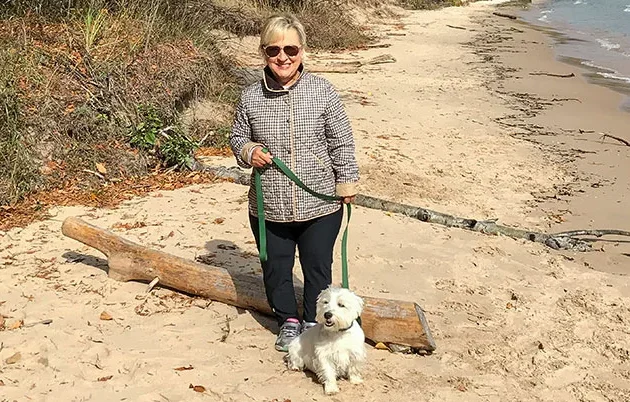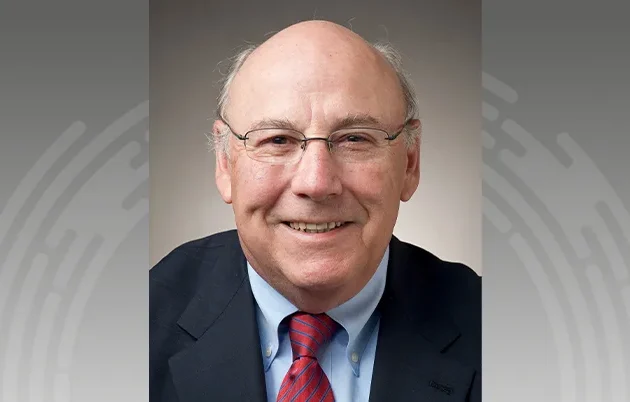Class Notes and Alumni Updates From Orthopedic Surgeons
2022 | 2017 | 2014 | 2013 | 2009 | 2008 | 2003 | 1999 | 1989 | 1968 | 1966
Alumni Updates
Printing New Bones
Briana Calore, MD ’05
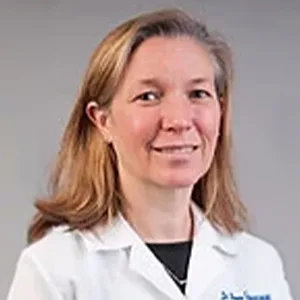
Through a fellowship with Roger Mann, MD, who wrote the textbooks I used, I received subspecialty training in foot and ankle surgery. Now, I am an attending orthopedic surgeon at Bassett Healthcare in Cooperstown, New York. I perform total ankle replacement; anterior and posterior total hip replacement; total knee replacement; fracture surgery; and ankle, knee, and shoulder arthroscopy.
Sometimes orthopedic surgery cases are simple, such as the need to acutely clean gravel from an ankle joint of a patient who was in a motorcycle accident. Other cases take more planning, such as the care needed by an otherwise healthy 40-year-old male with avascular necrosis, pain, and deformity of the bilateral tali due to steroid treatment for Crohn’s disease as a teenager. Instead of doing bilateral pantalar fusions, I contracted a company to design and 3D-print a custom talus bone that will articulate with a total ankle replacement.
During my first year of medical school, the cadaver in my anatomy lab had total knee replacements. They appeared state of the art, and I found them interesting. I started a research project in orthopedic spine surgery, and I enjoyed all aspects of my rotations in orthopedic surgery.
I did the first year of my residency at Wayne State University, Detroit, Michigan (Detroit Receiving, Sinai Grace, and Providence Hospitals), and at the beginning of my second year, I moved to Stanford University Hospital and Clinics in California. I am a member of the American Association of Orthopedic Surgery, the American Orthopaedic Foot and Ankle Society, the Ruth Jackson Society, and the Medical Society of the State of New York.
Fixing broken bones, realigning joints, and cutting out arthritis are all very satisfying daily activities. Patients with chronic pain are best treated by an interdisciplinary care team. Many of our patients recover and return to enjoying their hobbies, work, and time with loved ones.
Connecting Through Trauma
Danielle N. Ries de Chaffin, MD ’ 12 (PG ’ 17)
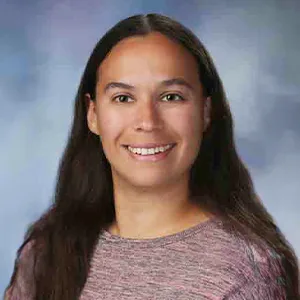
(PG ’17)
I am practicing orthopedic trauma at a Level 1 trauma center, the Billings Clinic, in Montana. Here, I see all levels of orthopedic trauma, from simple ankle fractures to the most complex pelvis and acetabular fracture cases.
My most memorable patient is a middle-aged gentleman who was hit by a car. He had five major injuries all involving his joints. I performed a complex surgery on him almost every day for a week. In my practice, the best feeling I have had so far was the first time he walked into my clinic and gave me a big hug after I had been wondering whether he would ever be able to walk again.
I knew I wanted to go into orthopedics in medical school, but I was not sure I would subspecialize in trauma orthopedics until my third year of residency at UW Health in Madison. While I enjoyed my training in every specialty, the trauma cases were always the most exciting and fulfilling to me. In addition to liking the surgical aspects of trauma care, I enjoyed the ability to connect with patients and their families during difficult times in their lives.
I am board certified by the American Board of Orthopaedic Surgery and am active as a fellow of the American Academy of Orthopaedic Surgeons, a clinical member of the Orthopaedic Trauma Association, and a member of AO Trauma and the Montana Orthopedic Society.
Orthopedics has many different subspecialties. I like the excitement and variety of orthopedic trauma, whereas others might like the ability to perfect a case that has a lot of repetition. Like most other surgical fields, training is grueling, but with a strong interest and dedication, it is also very rewarding.
The best piece of advice I could give to those interested in orthopedics is to find a mentor who can help you navigate through the inevitable ups and downs of the training process.
Helping Diabetic Patients
Patrick Scerpella, MD ’87
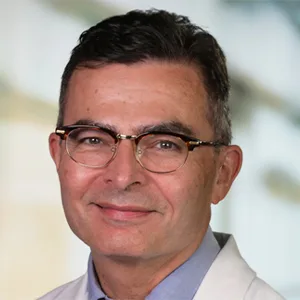
Currently, I practice at SSM Health – St. Mary’s Madison, with a subspecialty elective practice in foot and ankle orthopedics.
My father was a general and vascular surgeon, and when I entered medical school, I had an interest in surgery. During a third-year rotation in orthopedics, I developed an interest in this field. I completed a surgical internship at Gundersen Health System in La Crosse, Wisconsin, followed by an orthopedic residency at UW Health in Madison and a foot and ankle orthopedic fellowship at the University of Maryland Medical Center in Baltimore.
I am a member of the American Academy of Orthopedic Surgeons and the American Orthopedic Foot and Ankle Society.
Patients with diabetes are a group that really stands out as memorable. Their orthopedic foot and ankle problems are usually not routine and can be threatening to their limbs. Successful care can often be challenging. Patients are usually aware of the difficulty of their orthopedic problems.
I have found orthopedics to be consistently engaging and always changing. Though it is considered a surgical specialty, much of the care provided is non-operative, and this gives physicians more ways to help patients. The wide variety among the subspecialties of orthopedics provides opportunities for physicians to find their strengths.
Class Notes
Class of 2022
Megan Roedel received an honorable mention for presenting one of the top three abstracts at the Society for Fetal Urology’s Clinical Case Presentation Session. The September 2023 session allowed residents and fellows to present their most interesting or unique clinical cases. Roedel’s talk was titled “Challenges in Managing Complex Genitourinary Anomalies in a Neonatal Patient: Emphasizing the Role of Parental Engagement.” She is a second-year urology resident at UW Health in Madison.
Class of 2017
Sarah Donohue received the 2023 Distinguished Fellow Award from the American College of Rheumatology (ACR). Each year, the ACR honors clinical and research fellows who have performed meritoriously. Donohue completed an internal medicine residency and a rheumatology fellowship at UW Health. She is now an assistant professor in the Department of Medicine’s Division of Rheumatology at the University of Wisconsin School of Medicine and Public Health. She practices in the UW Health Rheumatology Clinic.
Class of 2014
Laurel Bessey received the Early-Career Development Award from the Association for Academic Psychiatry. The award recognizes promising faculty members and provides an opportunity to learn and share teaching techniques, skills, and innovations, and to network with other junior faculty members from across the country. She is an assistant professor in the Department of Psychiatry in the UW School of Medicine and Public Health and the associate residency training director for the Psychiatry Residency at UW Health, where she completed a psychiatry residency.
Class of 2013
Holly Caretta-Weyer was recently elected as the inaugural chair of the Council of Residency Directors’ Competency-Based Medical Education Task Force for Emergency Medicine. Her work in implementing competency-based education led the Royal College of Physicians and Surgeons of Canada to recognize her as the International Medical Educator of the Year in 2022. She now serves as the interim associate dean for admissions and director of assessment for the Stanford University School of Medicine, and director of evaluation and assessment for the Stanford University Emergency Medicine Residency Program. Caretta-Weyer completed an emergency medicine residency at UW Health, where she served as chief resident. She then completed a medical education scholarship fellowship at Oregon Health and Science University and a master’s degree in health professions education at the University of Illinois-Chicago. She is a PhD candidate at Maastricht University.
Class of 2009
Matthew Niesen completed an orthopedic surgery residency at the University of California, Los Angeles, where he served as chief resident. He then completed a fellowship in hip, knee, and shoulder replacement at the Mayo Clinic. While serving as the hospital chief of staff and a hospital board member at Prairie Ridge Health in Columbus, Wisconsin, Niesen discovered a passion for leadership, which led him to complete a master of health administration degree at Cornell University. In 2022, he moved to his current practice at Reedsburg Area Medical Center in Wisconsin. He aims to provide his patients with quality discussion time in the clinic, and state-of-the-art technology in the operating room. He has experience with robotic-assisted knee replacements and has performed more than 500 knee replacements using custom, 3D-printed knees. In fall 2023, Niesen was the first in Wisconsin to implant a “smart” knee, which provides feedback to the patient and provider after a total knee replacement. He and his wife, Mallory Niesen, have five children, ages 9 to 18. They love to travel, follow the Badgers, and support their children’s pursuits.
Class of 2008
Jaime Hook finished her post-doctoral training and started the Hook Lung Imaging Laboratory at the Icahn School of Medicine in New York City in 2019. She leads a team of eight scientists and trainees, and the team has published high-impact papers, including a recent one in the Journal of Clinical Investigation that, based on work in mouse models, proposes a new approach for preventing fatal secondary pneumonia in people with influenza. They hope this work will someday translate to clinical trials. During medical school at UW, Hook worked with Maureen Smith, MD, MPH, PhD, in the Department of Population Health Sciences, and Elizabeth Cox, MD, PhD, in the Department of Pediatrics, and she says those experiences fueled her interest in a career as a physician scientist.
Class of 2003
Meghan Lubner was awarded the 2023 Radiological Society of North America (RSNA) Lifetime Honored Educator Award. She is a professor in the Department of Radiology in the UW School of Medicine and Public Health and the chief of clinical and research CT abdominal imaging and intervention. She joined the faculty in 2009 after completing an internal medicine residency at Mallinckrodt Institute of Radiology at Washington University in St. Louis followed by an abdominal imaging fellowship at UW Health in Madison.
Class of 1999
Yolanda Whyte is serving as the president of Ethical and Respectful Treatment of Humans, also known as EARTH, a human rights organization. A pediatrician, she has expanded the scope of her practice to incorporate environmental health and advocacy. In this role, she advocates for child human rights and is dedicated to restoring humanity in institutionalized health care. Whyte completed a pediatrics internship at the Medical College of Virginia and a community pediatrics residency at Morehouse School of Medicine in Atlanta. She is a past member of the Environmental Protection Agency’s Children’s Health Protection Advisory Committee, as well as the past vice chair of the National Medical Association’s Environmental Health Task Force.
Class of 1989
Alan Glicklich was appointed as the chief medical officer for Nuvig Therapeutics, Inc., a venture-funded biotech company that develops novel biologic therapeutics to treat inflammatory autoimmune diseases. Glicklich has more than 25 years of experience working in biotech companies across all phases of development. He previously served as the chief medical officer for Chinook Therapeutics, a biotech company focused on treatment of rare kidney diseases, and Bird Rock Bio, which focuses on developing novel monoclonal antibodies.
Class of 1968
Barry Rumack was awarded the Prince Mahidol Award 2023 in the Field of Public Health. The award is named in honor of the Thai prince. Candidates for this award were considered by the Scientific Advisory Committee, International Award Committee, and board of trustees, at a meeting presided over by H.R.H. Princess Maha Chakri Sirindhorn. Rumack is a professor emeritus of pediatrics and emergency medicine and director emeritus of the Rocky Mountain Poison and Drug Center. His primary clinical and research interest has been in clinical toxicology, with a special interest in acetaminophen poisoning.
Class of 1966
William Busse will receive the American Academy of Allergy, Asthma, and Immunology (AAAAI) Lifetime Contribution to the AAAAI and A/I Specialty Award in 2024. He is being recognized for his excellence in leadership, service, research, clinical care, and mentorship, along with more than 50 years of contributions to the AAAAI. Busse has served as the academy’s president and as the leader of numerous committees and divisions. He also helped establish the AAAAI Foundation’s commitment to fund research of junior investigators at critical, early stages in their careers. As a result, the AAAAI Foundation has given more than $10 million to date.
